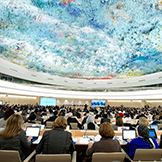Human Rights Council 32nd Session (13 June – 1 July 2016) Interactive Dialogue on High Commissioner Oral Report on Ukraine
29 June 2016
Ireland aligns itself with the statement delivered on behalf of the European Union and adds the following. Mr President, Ireland wishes to express its sincere appreciation for this latest update on the human rights situation in Ukraine and for the invaluable work of the OHCHR and the United Nations Human Rights Monitoring Mission in Ukraine. The support of the OHCHR for the Government of Ukraine in developing a National Human Rights Strategy and Action Plan is a hugely meaningful contribution to Ukraine’s reform programme.
Over two years on from the first report of the OHCHR on the human rights situation in Ukraine, the fourteenth edition highlights some recent positive developments. Most notably, we have seen the welcome release and return of Nadiya Savchenko and the further proliferation of civil society activity in Ukraine. We are however continuing to witness widespread violations of basic human rights, particularly in eastern Ukraine and Crimea.
The latest OHCHR report notes, “only the full implementation of the Minsk Agreements will result in conditions allowing due respect for international human rights norms”. It is therefore essential that all parties to the conflict fulfil the commitments they made under Minsk to work for a peaceful resolution of the conflict. Ongoing arbitrary detention, sexual violence, torture and ill-treatment in territories controlled by separatists in eastern Ukraine fundamentally undermine the Minsk Agreements.
The holding of credible local elections is another essential aspect of the Minsk Agreements. The restriction of the fundamental freedoms of expression, association and assembly in separatist-held parts of Donetsk and Luhansk is a serious impediment to the holding of elections in Donbas and every effort should be made towards striving for an improvement in the situation.
The continued denial of regular access for international human rights monitoring bodies including the OHCHR to the Crimean peninsula undermines the protection of human rights. Unfortunately since March 2014, there has been a severe deterioration in the human rights situation in Crimea, particularly for the Crimean Tatar community who have faced harassment and discrimination. The stifling of dissenting opinions represents an unacceptable attack on basic civil liberties. The decision of the so-called “prosecutor of Crimea” to prohibit the Crimean Tatar Mejlis, is just the latest example of this sharp deterioration.
Ireland would welcome your assessment of the environment for the holding local elections in separatist-controlled regions in line with the Minsk Agreements.
Thank you.

